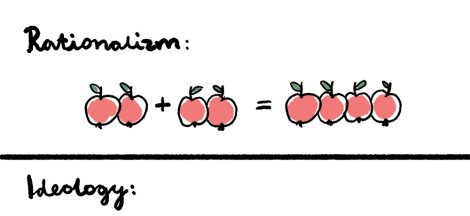Why is it so hard to reach any reasonable consensus on immigration? In 2006, we failed to reform our immigration system. Seven years later things do not look much better. The current Senate Bill S.744 has many vocal opponents, and even its supporters agree that it is just a tiny step in the right direction. Similarly, it seems unlikely that the House will come up with any concept gaining widespread support either. Where is the problem? Let me ask a tricky question: who is more to blame – the Senate or the House? The right answer is: the WSJ editorial page editors. To be precise, the blame is on media in general, in particular on the concept of the editorial writing practiced since the inception of newspapers. In this text I pick on the WSJ as, to the misfortune of the editors there, this is the main paper I read regularly.
Traditionally, every printed periodical has an ideological leaning; there is a set of values that the publication follows and promotes. In the not so remote past, there were at least a few newspapers in every town, there were many weekly and monthly periodicals as well, often locally owned; with an editor having his or her own political agenda. With such dispersion and variety, people were exposed to different ideas. With market consolidation, many small papers disappeared or were acquired. For those who remain independent it is cheaper to have syndicated political writers than to have a full editorial staff. On top of that, radio and TV stations were consolidated in a similar manner. As a result, Americans are now exposed to fewer political concepts and ideas than before. With this centralization, we have a relatively narrow group of media personas with nationwide influence; mostly those who are the best in their abilities to gather followers. It means a stronger bond with followers; it means as well that these followers are less likely open to other political concepts and ideas.
In this new environment, the concept of the editorial page as advancing a particular ideological orientation became obsolete as we do not have varieties of political orientations anymore. We have strong polarization of opinions. In the case of immigration, we just have two formations: for increased immigration and for restricted immigration. According to the recent opinion poll, 55% of Americans are for decreased immigration, 28% are for increased immigration, 10% are for no change and 7% are undecided. For the 55% of Americans, immigrants are perceived as taking their jobs, as ruining their neighborhoods, as a burden to the state, and as changing our nation for worse. These opponents of increased immigration are very passionate about their cause as they are driven by fears of losing something of value to them. For the remaining 45%, immigration is the net gain or they see it as the realistic and human approach to the simple fact that, as history has proved it to us, there is no way to forcefully stop migration of people in search for better opportunities.
In this landscape the numbers and the dynamics are not good for any reasonable immigration reform. The rift between opponents and supporters of increased immigration is deep and the two sides are like a bad marriage, they do not talk anymore and when they face each other, they yell. We need a shrink. And this is where the editors should step in, but they do not. Media failed us as the fourth branch of government.
Editorial pages should serve as a platform for public debates on issues of utmost importance within society. Major papers, such as the WSJ, share more of this civic responsibility than others. They do not fulfill it, as they follow an anachronistic model of promoting their set of values. In the case of immigration, the WSJ editors are in that 45% camp, and they publish many valuable articles promoting and explaining their position. These texts are valued and respected by these WSJ readers who are as well in that 45% camp, but they have very little effect on the readers who are in that 55% camp. It is worth noticing that most comments posted on the WSJ online edition are by vicious opponents of increased immigration. Despite this, besides occasionally publishing these opinions in the letters to editor section, the WSJ editorial page barely recognize and address concerns and aggravations of that 55% camp. If so, some attention is given to maneuvers in the corridors of Washington in order to outsmart ploys of the opposite side.
Parallel, there are other publications where arguments against increased immigration are presented and opposite arguments are ignored. Similarly, some attention is given to navigation in the corridors of Washington in order to outsmart the opposite side. As much as I agree that the political apparatus in Washington became dysfunctional, on this issue I would not like to be in the legislators’ shoes as with the almost half and half split within the nation, it is impossible to arrive at any reasonable compromise. No one seems to recognize that the solution is not in manipulating the lawmaking process but in understanding and addressing objections of the opponents. Plainly, unless either side wins the argument in a public debate and broadens its support this way, there is no hope for any reasonable immigration reform.
My reference point reaches back to my journalistic experiences in Poland in 1970s. The press there was similarly centralized, not due to the market consolidation as in the U.S. now, but as the part of the political system. Operating in the totalitarian system, dealing daily with censors, leading journalists tried to maximize their use of scarce freedoms of expression by being as objective as possible, through sticking to the facts and scientific deduction. This way they could avoid accusations of being anti-socialistic. Their persistence in this facts and logic based approach made a huge dent in the opinions of the political elites and politically aware citizens. This systematic effort built the foundation for the Solidarity movement and the transition several years later. My recollection from that experience is that despite censorship, we had more thorough political debates than I currently observe in the U.S.
There was no magic in this approach. It was just hard meticulous editorial work. An issue identified as of high importance was presented for the public scrutiny. Editors sought opinions offering better understanding of the problem. Opposite views were presented, then responses, then responses to the responses. Letters from readers, and responses to them were an important part of the process. When a major publication brought up an important subject, it resonated throughout all the press. Polemics, which have more appeal to readers, were much more common than in the American press now. A reader following such debate had a fair chance of finding most of the relevant information -understand interests and motivations of the parties involved; hear their arguments and arguments of their opponents and get a broader historical and geographical content. The complexity of this approach was the key, as this was the way to build and retain the customer’s trust.
Applying this approach would imply reexamination of the whole immigration dilemma in front of the WSJ readers. Why do we have the immigration law as we do? Is it good? Is it enforceable? Are there any other options? What should be the purpose of the immigration policy? How did we end up with such high population of illegal immigrants? What is the best way to eliminate this problem once and for all? Those are a few basic questions, just to get started. Representatives of both sides of the immigration split should be invited to answer these questions, then allowed the rebuttal. Editorial page editors should be moderators; they would be representing an average American trying to squeeze some sense out of that noise on the immigration issue.
Conducting this kind of public scrutiny might take a lot of paper, but it can be easily done online with periodical briefings in printed edition. Backed by the publicly conducted examination, the WSJ writers could take a firmer standing in expressing their opinions, and in challenging politicians and other media venues presenting views determined as false during the public analysis.
We have a political gridlock in Washington because, ironically, in the era of unprecedented abilities to communicate, we are unable to debate merits of our problems. Immigration is one example; health care is the next one. In the editorial writing concept as it is commonly practiced now, the term “communicate” reached its narrow meaning, as “to express” or “propagate.” Exchanging views and understanding opinions of others simply disappeared. Instead of searching for the truth, we have ex cathedra lecturing. Giving a chance to deliberative democracy might be worth trying. For the WSJ it is a business decision to consider. For readers it would mean a different paper. If implemented, would this change be welcome?



